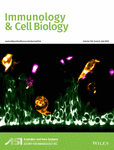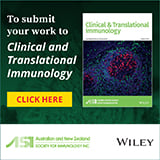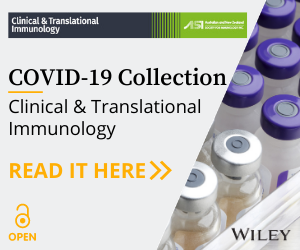Journal list menu
Export Citations
Download PDFs
Original Article
Differentiation of human monocytes and derived subsets of macrophages and dendritic cells by the HLDA10 monoclonal antibody panel
- First Published: 08 January 2016
Distinct subpopulations of cells can be identified by antibody binding, an Austrian team reports. Anna Ohradanova-Repic, Hannes Stockinger and co-workers at the Medical University of Vienna focused specifically on monocytes and the cells they give rise to, macrophages and dendritic cells. All three types of cells are involved in tissue maintenance and play key roles in immunity, and their unbalanced responses are linked to diseases such as cancer and auto-immune conditions. The team assessed a panel of 70 monoclonal antibodies submitted to an international workshop. By binding to cell surface markers, the antibodies could be used to differentiate between 10 key subpopulations of monocytes, macrophages and dendritic cells. The ability to identify these different types of cells will help to clarify their role in disease and to develop new diagnostic and therapeutic tools.
Treg activation defect in type 1 diabetes: correction with TNFR2 agonism
- First Published: 08 January 2016
A defect that prevents proper regulation of the immune system in type 1 diabetes can potentially be reversed via therapeutic interventions. This disease results in the destruction of pancreatic islet cells, which regulate blood glucose, by overactive immune cells. These immune cells are normally kept in check by regulatory T (Treg) cells. A team led by Denise Faustman at Massachusetts General Hospital recently explored how this regulation fails. They showed that in type 1 diabetes appropriate numbers of Treg cells are present, but primarily exist in a relatively inactive state. This low level of activation correlates with impaired pancreatic activity and glucose control. However, the researchers found they could biochemically stimulate the Treg cells with the TNF receptor 2 (TNFR2) to restrain the destructive immune cells. Drugs that replicate this effect could offer effective treatment for this still incurable autoimmune disease.
Editorial
Nomenclature of CD molecules from the Tenth Human Leucocyte Differentiation Antigen Workshop
- First Published: 22 January 2016
Original Article
Common variable immunodeficiency associated with microdeletion of chromosome 1q42.1-q42.3 and inositol 1,4,5-trisphosphate kinase B (ITPKB) deficiency
- First Published: 22 January 2016
Genetic analysis of an infection-prone patient reveals a gene that may contribute to a complex immune disorder. Estimates suggest that up to 1 in 25,000 people worldwide are born with common variable immunodeficiency (CVID), a genetic disorder that can cripple patients' immune defenses. Many genes contribute to CVID, and a case report from Sudhir Gupta and colleagues at the University of California at Irvine describes a new potential culprit. After examining a young man with developmental disorders and a history of recurrent infections, the researchers detected a sizeable deletion in one chromosome. Their analysis of the deleted segment of the chromosome led them to the ITP3KB gene, which encodes a protein associated with T and B cell functions. The patient's IPT3KB contained several mutations; two of them resulted in deficient production of ITP3KB protein which may play a role in immune deficiency.
Review
Oral immune therapy: targeting the systemic immune system via the gut immune system for the treatment of inflammatory bowel disease
- First Published: 29 January 2016
Original Article
New insights into the phenotype of human dendritic cell populations
- First Published: 29 January 2016
International laboratories have collaborated to assess the activity and clinical potential of a wide range of monoclonal antibodies. Monoclonal antibodies—pure preparations of antibodies derived from a single cell clone—are widely used for clinical research, diagnosis and therapy. Georgina Clark and colleagues at the ANZAC Research Institute in Concord, Australia, used their hosting of the recent Human Leucocyte Differentiation Antigen (HLDA10) Workshop to combine the expertise of antibody research groups from around the world. With a 3-decade history, the nomenclature conventions that have resulted from the HLDA workshops are particularly important. Monoclonal antibodies that recognize key cells of the immune system, particularly those known as dendritic cells, were submitted by many institutions and independently assessed by 15 international laboratories. This collaboration breaks down barriers that often inhibit the sharing of data and expertise, and provides an invaluable open database to accelerate the use of antibodies to fight disease.
Review
Histone deacetylases in monocyte/macrophage development, activation and metabolism: refining HDAC targets for inflammatory and infectious diseases
- First Published: 29 January 2016









